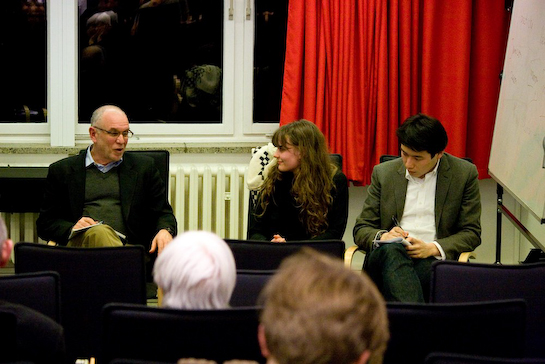
On March 5th ECLA welcomed Professor Jeffrey Goldfarb from the New School for Social Research in New York for a lecture on his new book Reinventing Political Culture. To start the discussion, two ECLA students delivered short introductions on how Professor Goldfarb’s book is relevant for their own research projects.
The first was fourth year BA student Tuvshinzaya Gantulga who talked about his thesis on Mongolian democracy through what he considered an interesting manifestation of “political culture”—the popularity of the Beatles in the country during Soviet times, which he saw as not merely introducing new music but as carrying with it an entirely different “truth regime” from that of the Communist government at the time.
Now, a Beatles monument stands in Ulaanbaatar, the country’s capital, memorialized as a contributor to Mongolia’s turn towards democracy. As the nation faces pressing political problems, Tuvshin raised his concerns about the fragility and subsequent erosion of political culture, particularly when there are strong economic interest groups working within the system. He asked how an existing political culture can confront power and make political institutions account for their decisions.
A similar concern was raised by Signe Larsen, a Project Year student from Denmark, who gave an overview of her research on the critique of parliamentary democracies. What she found in these institutions is a crisis of legitimacy, due to the fact that power and political life are increasingly separated from the public sphere.
As a consequence, what essentially happens at the level of governance is “biopolitics”—the notion that social life consists of problems of subsistence (e.g. job, food distribution, healthcare). The trend towards biopolitics erodes political life, as it tends to promote homogeneous social behavior, which may in turn produce tyranny, if it is not already a tyranny (of the majority) in itself. Signe sees the possibility of reinventing political culture as a significant means of overcoming the stagnation of public participation.
As a response to these issues, Professor Goldfarb put forward the recently concluded Russian elections as a possible case study. Though the political figures in power have not changed, there was visible change in the attitudes among citizens.
Goldfarb saw the close monitoring of elections, activity in social media and Moscow demonstrations as enacting the democratic aspect of a political culture that was assumed to be dormant or even non-existent, and asserted that all these events are not merely an outburst of political change but in fact the results of sustained political action over the years.
What Goldfarb hoped to highlight with Reinventing Political Culture was not only the search for democratic capacity from within institutions, but also the possibility of extending existing liberal democracies through culture and scientific knowledge.
Students and faculty alike were keen to ask questions, particularly as to the real-world possibility of his notion of reinvention. A student pointed out how Tocqueville views democracy as a limiting influence on the development of culture, and in response, Goldfarb highlighted the importance of resolving conflicts practically and not merely theoretically.
Regarding the case of activism in Russia, one of the professors raised the concern about the role of fear in inhibiting movement and change; Goldfarb replied that the most decisive factor in motivating citizens is the visibility and embodiment of alternatives and of positions of protest; hence the need to encourage such visibility in media and on the global stage.
Goldfarb noted that encouraging political culture does not always guarantee a change for the good, but creating opportunities for such a culture to flourish contributes, alongside the development of theories, to shaping change for a better tomorrow.
April Matias (2nd year BA, Philippines)
